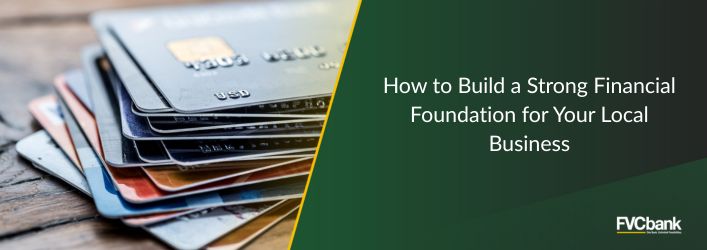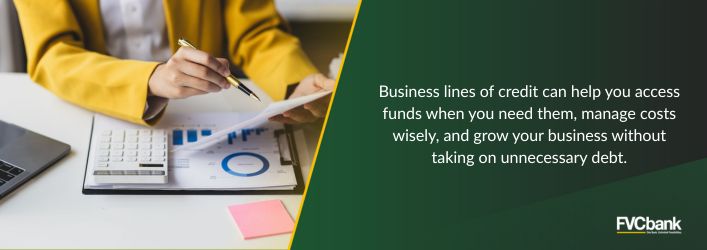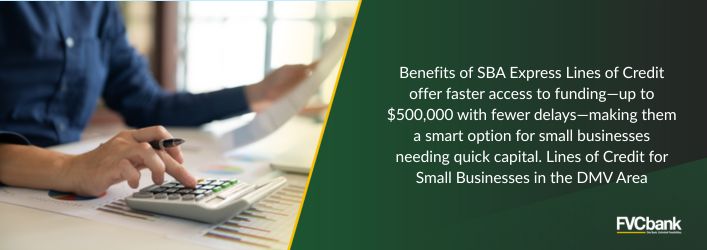
Is a Business Line of Credit Right for Your Small Business? Here’s What You Need to Know
When you’re running a small business, cash flow can be unpredictable. One month you’re flush, the next you’re waiting on a big client payment with bills coming due. That’s where a business line of credit can be a game-changer.
So, how does it work—and is it the right fit for your business? Let’s break it down.
Small businesses can access flexible financing through lines of credit; these function like credit cards but have lower interest rates. It’s also a way for your business to build good credit as you borrow from your line of credit and pay off the loan.
A Small Business Credit Survey by the Federal Reserve revealed that 59% of small businesses sought new financing in 2024. The most common reasons were to cover operating expenses (56%) and to pursue expansion or new opportunities (46%).
The survey also revealed that 41% of applicants received all the funding they sought, 36% received some of the financing they wanted, and 24% received none. Among businesses that did not seek funding within the previous year, 57% said it was because they already had sufficient financing.
What is a Business Line of Credit and How Does it Work?
A business line of credit is a type of small business loan that works like a credit card. It’s a type of business loan that’s there when you need it, and you can borrow as much as you need, up to your limit. You then pay back the loan over time and can tap into these funds, as needed. Lines of credit are typically smaller than other types of business loans, but they can often be obtained more quickly. They also offer lower interest rates than you would receive from a credit card.
Think of a business line of credit like a financial safety net. It’s a flexible loan that allows you to borrow up to a set limit—only when you need it. You’re only charged interest on what you use, and once you repay it, those funds become available again. It’s a revolving credit line, much like a credit card, but typically with lower interest rates and higher limits.
There are two types:
- Secured Line of Credit: Backed by collateral such as equipment, inventory, accounts receivable, or real estate.
- Unsecured Line of Credit: No collateral needed but may come with higher interest rates.
A business line of credit could either be a secured or an unsecured loan. With a secured line of credit, your business would put up some type of collateral, such as cash or any assets you may have. An unsecured business line of credit is one where the borrower does not provide collateral. Secured lines of credit are typically easier to obtain and offer more favorable terms and lower interest rates than unsecured loans.

How a Revolving Credit Helps Small Businesses Manage Cash Flow
One of the primary reasons that small businesses use a line of credit is to cover any financial shortfalls or cash flow problems and to take advantage of new business opportunities.
For example, a customer could place an unexpectedly large order, and you needed more equipment and supplies to meet that request and demand. With a business line of credit, you would have instant access to the funds you need and avoid the high interest costs of putting those expenses on a credit card.
If a customer experiences cash flow issues, they may not pay a bill on time. This situation could prevent you from covering your payroll and other expenses. A business line of credit might help you navigate that shortfall.
Business Loan vs. Line of Credit – What’s the Difference?
Business loans and lines of credit are both small business funding solutions that provide capital in different ways. A term business loan offers a lump sum payment that you receive upon approval, and your business begins making payments immediately. Business loans are typically obtained with a specific purpose in mind, such as launching a new product, acquiring another business, or purchasing equipment.
With a business loan, you could borrow more than you could with a line of credit, but your business will need some type of collateral, such as real estate, your business savings account, or equipment and inventory.
Business loans also have restrictions on their use. You cannot apply for a business loan to purchase equipment and then use the funds to cover a cash shortfall. With a line of credit, you can withdraw funds as needed and utilize them for any business-related purpose. Business loans are generally harder to obtain, as they have stricter credit requirements compared to lines of credit, but they typically offer lower interest rates than lines of credit.
A line of credit is one of the smartest tools for managing day-to-day operations and unexpected expenses. Here are a few common scenarios where it really shines:
- You land a big order and need to buy inventory fast.
- Payroll is due, but your client payment hasn’t come in yet.
- You’ve got a limited-time opportunity and need to act quickly.
In short—it helps keep your business moving, even when cash flow stalls.

Top Benefits of a Business Line of Credit for Small Businesses
There are many advantages to having a business line of credit, which is why so many small business owners rely on them. These are the top three reasons:
On-Demand Access to Funds:
Once you’ve obtained a business line of credit, it’s there whenever you need it, like an unused credit card. There’s no need to fill out additional forms. Once you’re approved, you can draw funds anytime without reapplying.
Pay Interest Only on What You Use
Like a credit card, you’re not charged for the full credit line—just what you’ve borrowed.
Avoid Over-Borrowing
Take only what you need, helping you manage debt wisely. Some companies aren’t sure how much funding they need when obtaining a business loan. They want to have enough capital on hand to fund their operations, but they also don’t want to end up with more debt than necessary. With a line of credit, you don’t have to worry about your supply of capital because it’s always available.
Who Qualifies for a Business Line of Credit?
Lines of credit are easier to obtain than regular business loans, but certain requirements must be met. It can be challenging for a brand-new business to secure a line of credit, as a few years of business history is generally required. You’ll need to provide proof of business income and annual revenues. Your business credit score will be a factor, and the owner’s credit score may also be considered. You might be asked to submit a business plan that outlines your revenue goals and the methods you will use to achieve them.
A strong banking relationship can help in obtaining a line of credit. By working with a local banker who understands the local economy and takes the time to get to know you and your business, they can advocate on your behalf and help you find the right loans for your business.
Getting approved for a business line of credit is often easier than a traditional term loan. Most lenders look for:
- A solid track record (a few years in business)
- Consistent annual revenue
- Strong credit history
- A clear, realistic business plan
Having a strong relationship with your bank can also improve your chances. At FVCbank, we take the time to understand your business and advocate for the best solution.
When Should a Small Business Use a Line of Credit?
Many small business owners pursue a business line of credit soon after they start their companies. They may have started their business with some venture capital, their savings, or a small business loan, and they want a line of credit available whenever they need additional funds.
The best time to apply for a line of credit is before you desperately need one. That way, you’re more likely to get approved—and have it ready when the need arises. Great use cases include:
- Seasonal revenue dips
- Delayed customer payments
- Short-term cash crunches
- New product launches
- Inventory purchases
- Emergency repairs
Avoid using it for high-risk ventures, long-term investments, or as a primary funding source. Always have a clear repayment plan in place.
Smart Ways to Leverage a Line of Credit for Growth
For many business owners, the best way to use a line of credit is for their operating expenses, to cover a cash shortfall, or to fund an expansion. If you need funds to launch a new product line, buy equipment, and inventories, a line of credit can provide that capital whenever you need it, with no need to wait for loan approval.
They’re also useful for businesses that are seasonal or whose revenue is vulnerable to changes in the weather that can be hard to predict. A business owner could have a line of credit standing by to get through any temporary slumps.
Avoiding Debt Pitfalls – When NOT to Use a Line of Credit
While lines of credit are used by many businesses, there are some downsides to using them.
Some business owners can find themselves in a difficult situation by over-relying on their line of credit or making risky investments, believing they can fall back on the credit line if the investment doesn’t pan out. Some businesses use their line of credit to launch a new product or service that fails to meet their revenue expectations. This could result in excessive debt and insufficient revenue to repay the loan. Before tapping into a line of credit, ensure you’ll be able to pay it off on time and have a solid plan in place to do so.

Insights from FVCbank on Financial Planning for Small Businesses
While you’ve probably done your homework on financial planning, it doesn’t hurt to get advice from a bank that specializes in small business and commercial lending. Smart cash management makes a big difference. FVCbank recommends the following best practices:
- Keep at least three months of operating expenses on hand.
- Use your credit line wisely—not like a savings account.
- Monitor your cash flow closely.
- Keep business credit card balances low.
- Lease equipment if upgrades are frequent.
- Set clear payment terms—and enforce them.
- Prioritize high-interest debt for repayment.
What Are Some Alternatives to a Business Line of Credit?
Of course, there are many alternatives to a business line of credit. At FVCbank we offer a variety of commercial-lending products.
SBA CAPline Business Loans
The Small Business Administration (SBA) offers many types of government-backed small business loans. If you’re unable to obtain a regular line of credit for your business, you might be eligible for an SBA CAPline. They’re intended to help small businesses meet their short-term and cyclical needs for working capital. These lines of credit are available for up to $5 million. SBA guarantees are good for a maximum of 85% for loans of $150,000 and 75% for loans of more than $150,000.
If a traditional line of credit isn’t a fit, FVCbank offers flexible alternatives like SBA CAPLines—government-backed revolving lines of credit for small businesses with short-term or seasonal working capital needs.
Types include:
- Seasonal CAPLine: For businesses with seasonal swings in sales or labor costs.
- Contract CAPLine: Ideal for funding individual contracts, including overhead.
- Builders CAPLine: For small construction firms building or renovating properties.
- Working CAPLine: General short-term working capital for everyday operations.

SBA Express Lines of Credit
SBA Express Loans can also be obtained as lines of credit for up to $500,000 and an SBA maximum guarantee of 50% for up to 10 years. These loans can be obtained from a lender without review by the SBA, which means they can typically be obtained faster than other SBA-backed loans.
Business Term Loans
Commercial term loans are typically thought of as a standard business loan. Businesses obtain these loans for a specific need, such as buying equipment, business expansion, or consolidation. At FVCbank, we offer business loans with competitive market rates and terms of up to seven years.
Term loans are better for one-time, large expenses like purchasing equipment or expanding your business. You get a lump sum upfront and repay it with set monthly payments over a fixed term. They usually require collateral and may offer lower interest rates than a line of credit.
So, how do you choose?
- Line of Credit: Best for flexibility and short-term needs.
- Term Loan: Best for planned, long-term investments.
Asset-Based Loans
An asset-backed loan is a type of business loan that uses some of your business assets as collateral to secure a favorable interest rate. This may include cash reserves, business equipment, and inventory, or your building if you own it. These assets can be utilized to meet various needs, such as business expansion, purchasing equipment, refinancing other business debts, or covering seasonal demands.
Why Work FVCbank is the Best Partner for Small Business Financing
At FVCbank, we specialize in helping small businesses in Maryland, Northern Virginia, and the DC Metro area thrive. Whether you’re just starting or ready to expand, we offer competitive rates and personalized guidance every step of the way.
Let’s talk. Call us at (703) 436-3800, visit one of our locations, or connect with us online. We’re here to help your business succeed.




